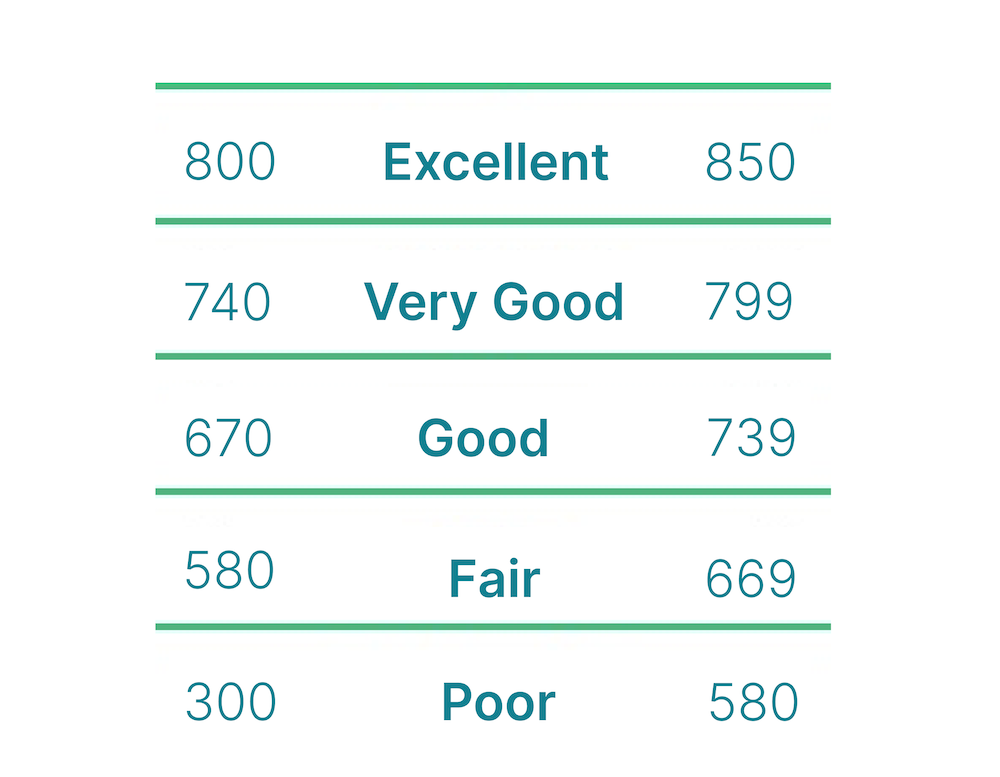6 Common Mistakes that Can Impact Your Credit Score
Your credit score plays a major role in your financial health. Whether you're applying for a credit card, auto loan, or even renting an apartment, a higher credit score can help you secure better terms and lower interest rates. If you’re not at an “excellent” credit score rating yet, here are some steps that can help you learn how to potentially improve your credit score and maintain it.

What Is a Credit Score and Why Does It Matter?
A credit score is a three-digit number that represents your creditworthiness, or how risky creditors consider it would be to lend you money. Lenders, landlords, and even employers use it to assess how responsibly you manage debt.
Credit Score Range
Most lenders consider 670 or above to be a good credit score, but a higher credit score may help you qualify you for lower interest rates, credit cards with better perks, and even your desired apartment. The FICO credit score range is:

According to TransUnion as of March 13, 2025.
6 Common Mistakes to Avoid
1. Not Paying Your Bills On Time
Your payment history makes up 35% of your FICO® Score and 40-41% of your VantageScore® , so even one missed payment can affect your credit score.
Tip: Setting up automatic payments or reminders can help you avoid late payments and protect your credit score.
2. Having a High Credit Utilization Ratio
Your credit utilization ratio measures the balances you owe on your credit cards compared to the cards’ credit limits. While there is no magic number, generally keeping it below 10% and consistently paying bills on time can help you build and maintain a good FICO® Score.
Example: If your credit card limit is $10,000, try to keep your balance below $1,000.
3. Closing Your Oldest Credit Accounts
Length of credit history accounts for 15% of your FICO® credit score. Keeping older accounts open can boost your credit score over time.
Important: There are times when it could make sense to close a paid-off credit card, like if you’re having difficulty paying the annual fee.
4. Not Asking for a Higher Credit Limit
Increasing your credit limit lowers your utilization ratio, which can improve your credit score as long as your spending doesn’t improve.
Pro tip: Some credit card issuers let you request a credit line increase through their app or website.
5. Not Checking Your Credit Report for Errors
You’re entitled to a free credit report every 12 months from each bureau at AnnualCreditReport.com. Look for incorrect late payments, closed accounts listed as open, or fraudulent accounts—all of which can impact your credit score.
6. Not Using Credit-Building Products
Using a traditional secured credit card or credit-builder loan can help build your credit history. Boost Money™ Card through Upgrade can also help you build your credit responsibly while you spend with on-time payments. Unlike traditional secured credit cards, Boost Money™ Card has no set limit, minimum deposit, interest, or late fees and can help you build credit over time with responsible use.
How Long Does It Take to Improve a Credit Score?
There is no exact amount of time it takes to improve your credit score, and everyone’s credit score is unique to their financial situation. Consider these general guidelines that can typically help you boost your credit score:
- Quick fixes (1–2 months): Pay down balances, dispute errors, and start building credit responsibly with Boost Money Spend™ or a credit builder loa
- Medium-term (3–6 months): Establish your payment history and build your credit mix
- Long-term (6–12+ months): Maintain low credit utilization and strong payment habits
Final Takeaway
Boosting your credit score doesn’t happen overnight, but consistent financial habits and smart credit management can lead to improvements over time. Focus on paying bills on time, keeping balances low, and checking your credit report regularly.
The Boost Money™ Card requires a Boost Money™ Spend account, a deposit account with funds held as security for the Boost Money™ Card. Credit Lines feature an Annual Percentage Rate (APR) of 0.00% and a single 1 month repayment term and are subject to verification and approval. Your line is determined by the amount deposited into your Boost Money™ Spend account. At your option, repay your transactions each month with your Boost Money™ Spend account funds. For example, a $100 card purchase with a 1 month term and a 0% APR has a required single installment payment of $100. There is no fee to use an AllPoint® ATM. ATM withdrawals outside the AllPoint® ATM network are subject to a $2.50 per withdrawal fee, which will increase your finance charge and APR. The Boost Money™ Card is unique in that it allows you to obtain individual closed-end loans which you may access through transactions such as card purchases up to your line amount. The Boost Money™ Card is not available in all states.
Add funds to your Boost Money™ Spend account, and spend up to the available balance with Boost Money™ Card. We'll report on-time payments to the three major credit bureaus (Transunion®, Experian®, and Equifax®) to help you build credit over time. Late payments, delinquencies or other derogatory activity on this account or your other credit card accounts and loans may adversely impact your ability to build credit.


